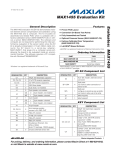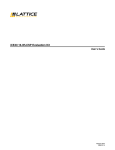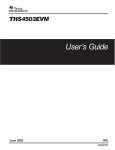Download Texas Instruments ADS5411 EVM User's Manual
Transcript
ADS5423/24/33 and ADS5411 EVM User Guide User's Guide February 2006 SLWU020B 2 SLWU020B – February 2005 – Revised February 2006 Submit Documentation Feedback Contents 1 Overview ................................................................................................................... 5 1.1 Purpose .............................................................................................................. 5 1.2 EVM Basic Functions............................................................................................... 5 1.3 Power Requirements ............................................................................................... 5 1.4 EVM Operational Procedure 1.3.1 2 Voltage Limits .............................................................................................. 5 Circuit Description ...................................................................................... 5 ..................................................................................................... 7 2.1 Schematic Diagram ................................................................................................. 7 2.2 Circuit Function 7 2.2.1 7 2.2.2 2.2.3 ..................................................................................................... Analog Inputs .............................................................................................. Power ........................................................................................................ Outputs ...................................................................................................... Parts List 4 Physical Description 4.2 7 .................................................................................................................. 9 3 4.1 7 ................................................................................................. 11 ........................................................................................................ 11 Schematics ......................................................................................................... 17 PCB Layout SLWU020B – February 2005 – Revised February 2006 Submit Documentation Feedback Contents 3 List of Figures 4-1 4-2 4-3 4-4 4-5 4-6 Top Layer.................................................................................................................... Layer 2, Ground Plane .................................................................................................... Layer 3, Power Plane #1 .................................................................................................. Layer 4, Power Plane #2 .................................................................................................. Layer 5, Ground Plane .................................................................................................... Layer 6, Bottom Layer .................................................................................................... 11 12 13 14 15 16 List of Tables 1-1 2-1 2-2 3-1 4 Three Pin Jumper List Table ............................................................................................... Output Connector J9 ........................................................................................................ Test Point Description ....................................................................................................... Bill of Materials for EVM .................................................................................................... List of Figures 6 8 8 9 SLWU020B – February 2005 – Revised February 2006 Submit Documentation Feedback Chapter 1 SLWU020B – February 2005 – Revised February 2006 Overview This User’s Guide document gives a general overview of the ADS5423/24/33 and ADS5411 evaluation module (EVM) and provides a general description of the features and functions to be considered while using this module. 1.1 Purpose The EVM provides a platform for evaluating the ADS5423/24/33 14-bit analog-to-digital converter (ADC) under various signals, references, and supply conditions. This evaluation module also allows the evaluation of the ADS5411, an 11-bit analog-to-digital converter. This document should be used in combination with the EVM schematic diagram supplied. 1.2 EVM Basic Functions Analog input to the ADC is provided via external SMA connectors. The single-ended input the user provides is converted into a differential signal at the input of the device. One input path uses a differential amplifier, while the other input is transformer coupled. The EVM provides an external SMA connector for input of the ADC clock. The single-ended input the user provides is converted into a differential signal at the input of the device. Digital output from the EVM is via a 40-pin connector. The digital outputs from the ADC are buffered before going to the connector. Power connections to the EVM are via banana jack sockets. Separate sockets are provided for the ADC analog and digital supplies, the external buffer supply, and the differential amplifier supply. 1.3 Power Requirements The EVM can be powered directly with only two supplies: a 3.3-V supply for the ADC digital driver supply and external buffer supply, and 5 V for the ADC analog supply if using the EVM with transformer coupled analog inputs. If using the differential amplifier analog inputs, ±5 V is required. Provision has also been made to allow the EVM to be powered with independent 3.3-V supplies to provide higher performance. 1.3.1 Voltage Limits Exceeding the maximum input voltages can damage EVM components. Under voltage may cause improper operation of some or all of the EVM components. 1.4 EVM Operational Procedure The EVM provides a flexible means of evaluating the ADS5423/24/33 or ADS5411 in a number of modes of operation. A basic setup procedure that can be used as a board confidence check is as follows: 1. Verify all jumper settings against the schematic jumper list in Table 1-1. SLWU020B – February 2005 – Revised February 2006 Submit Documentation Feedback Overview 5 www.ti.com EVM Operational Procedure Table 1-1. Three Pin Jumper List Table JUMPER FUNCTION LOCATION: PINS 1–2 LOCATION: PINS 2–3 DEFAULT Source provided from Diff Amp 1–2 SJP3 Provides AIN+ source to ADC device Source provided from T2 SJP4 Provides AIN– source to ADC device Source provided from Diff Amp Source provided from T2 2-3 2. Connect supplies to the EVM as follows: +5 V (4.75 V–5.25 V) ADC analog supply to J3 and return to J2. +3.3 V (3 V–3.6 V) digital buffer supply to J4 and J1 and return to J6 3. Switch power supplies on. 4. Use a function generator with 50-Ω output to input a 105-MHz, 0-V offset, 1-Vrms sine-wave signal into J5. The frequency of the clock must be within the specification for the device speed grade. 5. Supply an input signal by using a frequency generator with a 50-Ω output to provide a 15.5 MHz, 0-V offset, –1-dBFS amplitude sine-wave signal into J11. A full-scale input tone into the ADC device is a differential 2.2 Vpp and dBFS can be calculated by using the following formula: captured max code * captured min code * dBFS + 20 log , where N is the number of bits. 2N 6. The digital pattern on the output connector J9 should now represent a 2's compliment sine wave and can be monitored using a logic analyzer. 6 Overview SLWU020B – February 2005 – Revised February 2006 Submit Documentation Feedback Chapter 2 SLWU020B – February 2005 – Revised February 2006 Circuit Description 2.1 Schematic Diagram The schematic diagram for the EVM is attached at the end of this document. 2.2 Circuit Function The following paragraphs describe the function of EVM circuits. See the relevant data sheet for the device operating characteristics. 2.2.1 Analog Inputs The EVM can be configured to provide the ADC with either transformer-coupled or differential amplifier inputs from a single-ended source. The default configuration uses the transformer configuration for which the layout has been optimized to give the best performance. The inputs are provided via SMA connectors J11 for transformer coupled input and J10 for differential amplifier input. To setup for one of these options, the EVM must be configured as follows: 1. For a 1:1 transformer coupled input to the ADC, a single ended source is connected to J11. SJP3 has pins 1 and 2 shorted and SJP4 has pins 2 and 3 shorted. This is the default configuration for the EVM. 2. For a differential input into the amplifier, the input source is connected to J10. SJP3 has pins 2 and 3 shorted and SJP4 has pins 1 and 2 shorted. ±5VDC must be connected to the board to provide power to U3 and U4 for this configuration. 2.2.2 Power Power is supplied to the EVM via banana jack sockets. A separate connection is provided for a +3.3V digital buffer supply (J1 and J2), 5-V analog supply (J3 and J2), ±5-V amplifier supply (J7, J8, and J12), and 3.3-V external buffer supply (J4 and J6). A single 3.3-V buffer supply could be used by installing L6. In this case, connect the 3.3 V to J1 and the return to J2. 2.2.3 Outputs The data outputs from the ADC are buffered using a Texas Instruments SN74AVC16244. Output data header J9 is a standard 40-pin header on a 100-mil grid, and allows easy connection to a logic analyzer. The connector pinout is listed in Table 2-1. Furthermore, two test points are provided and can be monitored using a multimeter. Description of the test points is listed in Table 2-2. SLWU020B – February 2005 – Revised February 2006 Submit Documentation Feedback Circuit Description 7 www.ti.com Circuit Function Table 2-1. Output Connector J9 J9 PIN DESCRIPTION J9 PIN DESCRIPTION 1 CLK 21 DATA BIT 6 2 GND 22 GND 3 NC 23 DATA BIT 7 4 GND 24 GND 5 NC 25 DATA BIT 8 6 GND 26 GND 7 NC 27 DATA BIT 9 8 GND 28 GND 9 DATA BIT 0 (LSB) 29 DATA BIT 10 10 GND 30 GND 11 DATA BIT 1 31 DATA BIT 11 12 GND 32 GND 13 DATA BIT 2 33 DATA BIT 12 14 GND 34 GND 15 DATA BIT 3 35 DATA BIT 13 (MSB) 16 GND 36 GND 17 DATA BIT 4 37 OVERFLOW 18 GND 38 GND 19 DATA BIT 5 39 DRVDD 20 GND 40 GND Table 2-2. Test Point Description 8 TEST POINT FUNCTION J14 Monitor Vref (AVDD/2) J17 Monitor DMID (DVDD/2) Circuit Description SLWU020B – February 2005 – Revised February 2006 Submit Documentation Feedback Chapter 3 SLWU020B – February 2005 – Revised February 2006 Parts List Table 3-1 lists the parts used in constructing the EVM Table 3-1. Bill of Materials for EVM VALUE QTY PART NUMBER VENDOR REF DES NOT INSTALLED 0.1 µF, 25 V, +80/–20% Capacitor 4 ECJ-0EF1E104Z Panasonic C1, C2, C3, C4 0.01 µF, 25 V, +80/–20% Capacitor 6 ECJ-0EF1E103Z Panasonic C30, C31, C32, C33, C34, C35 220 pF, 50 V, 5%, Capacitor 6 ECJ-OEC1H221J Panasonic C41–C46 22 pF, 50 V, 5%, Capacitor 1 ECJ-1VC1H220J Panasonic C26 220 pF, 50 V, 5%, Capacitor 3 ECJ-1VC1H221J Panasonic C47, C48, C49 0.01 µF,16 V, 10% Capacitor 7 ECJ-1VB1C103K Panasonic C27, C28, C29, C36, C37, C38, C39 0.1 µF,16 V, 10% Capacitor 12 ECJ-1VB1C104K Panasonic C6, C8, C11, C12, C14, C16, C17, C18, C19, C24, C25, C40 470 pF,50 V, 5% Capacitor 4 ECJ-1VC1H471J Panasonic C20, C21, C22, C23 10 µF, 10 V, 10%, Capacitor 1 ECS-T1AX106R Panasonic C15 33 µF, 10 V, 10% Capacitor 5 ECS-T1AX336R Panasonic C5, C7, C9, C10, C13 51.1 Ω 2 CTS_742 CTS R5, R25 0Ω 2 CTS_742 CTS R7, R8 24.9 Ω resistor, 1/16 W, 1% 4 ERJ-3EKF24R9V Panasonic R6, R11, R12, R27 49.9 Ω resistor, 1/16 W, 1 % 5 ERJ-6EKF49R9V Panasonic R1, R4, R10, R18, R23 36.5 Ω resistor, 1/16 W, 1% 2 ERJ-6EKF36R5V Panasonic R2, R3 499 Ω resistor, 1/16 W, 1% 4 ERJ-6EKF4990V Panasonic R14, R15, R16, R17 0 Ω resistor, 1/16 W, 1% 1 ERJ-6ENF0R00V Panasonic R24 200 Ω resistor, 1/16 W, 1% 0 ERJ-3RKF2000X Panasonic CAPACITORS RESISTORS R9 R13 FERRITE BEAD, JUMPER, TRANSFORMER, JACKS, CONN etc. Ferrite Bead 5 EXC-ML32A680U Minicircuits L1–L5 ADT1-1WT 1 ADT1-1WT Minicircuits T2 ADT4-1WT 1 ADT4-1WT NEWARK T3 SMA End Small 3 16F3627 Keystone J5, J10, J11 Red Test Point 1 5001K-ND Keystone J14 Black Test Point 1 5000K-ND Allied J17 Red Banana Jack 5 ST-351A Allied J1, J3, J4, J8, J12 Black Banana Jack 3 ST-351B Samtec J2, J6, J7 40-Pin IDC Connector 1 TSW-120-07-L-D 3 Circuit Jumper 2 SLWU020B – February 2005 – Revised February 2006 Submit Documentation Feedback J9 SJP3, SJP4 Parts List 9 www.ti.com Table 3-1. Bill of Materials for EVM (continued) VALUE QTY PART NUMBER VENDOR REF DES ADS5423/24/33 or ADS5411 1 ADS5423/24/33 or ADS5411 Texas Instruments U1 SN74AVC16244 1 SN74AVC16244DGG Texas Instruments U2 THS4503 1 THS4503 Texas Instruments U3 THS4601 1 THS4601 Texas Instruments U4 NOT INSTALLED ICs Surface Mount Jumper Location: SJP3 (2–1), SJP4 (2–3) 10 Parts List SLWU020B – February 2005 – Revised February 2006 Submit Documentation Feedback Chapter 4 SLWU020B – February 2005 – Revised February 2006 Physical Description This chapter describes the physical characteristics and PCB layout of the EVM and lists the components used on the module. 4.1 PCB Layout The EVM is constructed on a 6-layer, 4.77-inch × 3.4-inch, 0.062-inch thick PCB using FR-4 material. The individual layers are shown in Figure 4-1 through Figure 4-6. Figure 4-1. Top Layer SLWU020B – February 2005 – Revised February 2006 Submit Documentation Feedback Physical Description 11 www.ti.com PCB Layout Figure 4-2. Layer 2, Ground Plane 12 Physical Description SLWU020B – February 2005 – Revised February 2006 Submit Documentation Feedback www.ti.com PCB Layout Figure 4-3. Layer 3, Power Plane #1 SLWU020B – February 2005 – Revised February 2006 Submit Documentation Feedback Physical Description 13 www.ti.com PCB Layout Figure 4-4. Layer 4, Power Plane #2 14 Physical Description SLWU020B – February 2005 – Revised February 2006 Submit Documentation Feedback www.ti.com PCB Layout Figure 4-5. Layer 5, Ground Plane SLWU020B – February 2005 – Revised February 2006 Submit Documentation Feedback Physical Description 15 www.ti.com PCB Layout Figure 4-6. Layer 6, Bottom Layer 16 Physical Description SLWU020B – February 2005 – Revised February 2006 Submit Documentation Feedback www.ti.com Schematics 4.2 Schematics SLWU020B – February 2005 – Revised February 2006 Submit Documentation Feedback Physical Description 17 1 2 3 4 5 6 D D +VCC J10 SMA_PCB_MT_MOD 5 4 3 2 R4 49.9 CLK+ 4 CLK+ (Sh 2) R6 24.9 U3 2 NC C2 1 499 R10 49.9 .1uF 5 499 3 3 C1 5 4 3 2 1 C 1 T3 ADT 4-1WT R14 7 J5 SMA_PCB_MT_MOD R17 CLK- 6 8 CLK- (Sh 2) .1uF 2 C40 THS4503 C +VCC 5 + C26 VCM VOUT- 20pF VOCM R23 VOUT+ .1uF 1 4 - 49.9 -VCC -VCC 4 6 -VCC U4 2 6 R15 R27 499 499 24.9 +VCC (2-1) SJP3 J11 SMA_PCB_MT_MOD 1 1 5 4 3 2 T2 ADT 1-1WT 6 R2 R9 5 49.9 R11 24.9 AIN+ 36.5 AIN+ (Sh 2) AIN- (Sh 2) B R13 200 36.5 (Note 1) 4 3 3 2 (2-1) 2 R3 (Note 1) VREF (Sh 2) 1 B VREF 0 3 R18 49.9 R24 3 THS4601 7 R16 C24 SJP4 (2-3) R12 2 .1uF AIN- 1 24.9 ti A A 12500 TI Boulevard. Dallas, Texas 75243 Title: NOTE 1. DO NOT INSTALL Engineer: J. SETON Drawn By: Y. DEWONCK FILE: 1 2 3 4 5 ADS5424 DOCUMENTCONTROL # DATE: 8-Dec-2004 REV: SIZE: 6 SHEET: 1 OF: A 4 9 10 (Sh 1) AIN+ (Sh 1) AIN- AIN+ 11 AIN- 12 13 (Sh 3) (Sh 3) D OVR (Sh 3) 6 OVR D0 D0 (Sh 3) D1 D1 (Sh 3) D2 D2 D3 D3 (Sh 3) (Sh 3) D4 40 D4 D5 41 D5 (Sh 3) (Sh 3) D6 44 D6 (Sh 3) D7 45 D7 (Sh 3) D8 46 D8 (Sh 3) D9 47 D9 (Sh 3) D10 48 D10 (Sh 3) D11 49 D11 D12 50 D12 D13 D13 DRY 52 D4 D5 42 DVSS 43 DVDD D6 D7 D8 D9 D10 D11 D12 -ENC DVSS LVSS DVDD LVDD OVR CVDD DNC CVSS AVDD +AIN ADVSS -AIN ADVDD AVSS AVDD 8 DMID ADS5424 AVSS 7 U1A +ENC CEXT2 6 AVSS 5 CLK- D0 AVDD CLK- CLK+ D1 VSS AVSS (Sh 1) CLK+ VBG CEXT1 (Sh 1) D2 AVSS 4 D3 AVSS AVDD 3 DVDD AVSS 2 ABVDD 1 AVDD .1uF D13 C25 DRY VREF C 5 3.3V_DVDD J14 RED (Sh 1) VREF 4 51 DRY D (Sh 3) 3 (Sh 3) 2 ABVSS 1 B PBKG 39 C 38 J17 BLACK 37 36 35 34 33 32 31 30 29 28 27 B C3 C4 .1uF .1uF 26 25 24 23 22 21 20 19 18 17 16 15 14 5V_AVDD U1B ADS5424 61 62 63 64 65 66 67 68 69 70 71 72 73 A PPAD PPAD PPAD PPAD PPAD PPAD PPAD PPAD PPAD PPAD PPAD PPAD PPAD PPAD PPAD PPAD PPAD PPAD PPAD PPAD PPAD PPAD PPAD PPAD PPAD PPAD 86 85 84 83 82 81 80 79 78 77 76 75 74 ti A 12500 TI Boulevard. Dallas, Texas 75243 Title: NOTE 1. DO NOT INSTALL Engineer: J. SETON Drawn By: Y. DEWONCK FILE: 1 2 3 4 5 ADS5424 DOCUMENTCONTROL # DATE: 8-Dec-2004 REV: SIZE: 6 SHEET: 2 OF: A 4 1 2 D 3 4 5 6 D DRVDD C15 + C16 C17 C18 C19 C20 C21 C22 C23 .1uF .1uF .1uF .1uF 470pF 470pF 470pF 470pF 10uF U2 SN74AVC16244DGG 25 (SH 1) DRY DRY R1 26 220 27 28 D13 D12 D11 D10 D9 D8 D7 D6 D13 D12 D11 D10 D9 D8 D7 D6 C 29 R5 1 2 3 4 5 6 7 8 30 16 15 14 13 12 11 10 9 31 32 33 34 35 220 36 (SH 1) 37 R25 D5 D4 D3 D2 D1 D0 OVR D5 D4 D3 D2 D1 D0 OVR 1 2 3 4 5 6 7 8 38 16 15 14 13 12 11 10 9 39 40 41 42 43 44 220 45 46 47 48 3 OE 4 OE 4A4 4Y4 4A3 4Y3 GND GND 4A2 4Y2 4A1 4Y1 VCC VCC 3A4 3Y4 3A3 3Y3 GND GND 3A2 3Y2 3A1 3Y1 2A4 2Y4 2A3 2Y3 GND GND 2A2 2Y2 2A1 2Y1 VCC VCC 1A4 1Y4 1A3 1Y3 GND GND 1A2 1Y2 1A1 1Y1 2 OE 1 0E 24 23 22 21 20 19 18 17 16 15 1 2 3 4 5 6 7 8 R7 0 DRVDD CLK 16 15 14 13 12 11 10 9 J9 OVR/ 14 13 12 11 10 9 8 7 6 5 4 3 1 2 3 4 5 6 7 8 R8 0 16 15 14 13 12 11 10 9 CLK OVR/ 39 37 35 33 31 29 27 25 23 21 19 17 15 13 11 9 7 5 3 1 C 40 38 36 34 32 30 28 26 24 22 20 18 16 14 12 10 8 6 4 2 40PIN_IDC 2 1 B B ti A A 12500 TI Boulevard. Dallas, Texas 75243 Title: NOTE 1. DO NOT INSTALL Engineer: J. SETON Drawn By: Y. DEWONCK FILE: 1 2 3 4 5 ADS5424 DOCUMENTCONTROL # DATE: 8-Dec-2004 REV: SIZE: 6 SHEET: 3 OF: A 4 1 2 3 4 5 6 +3.3VA-PS DRVDD J4 L5 1 D 2 DRVDD D + J6 C13 C14 33uF .1uF GND L6 1 2 (Note 1) 3.3V_DVDD J1 L1 1 2 DVDD + C5 C6 C27 C28 C29 C47 C48 C49 .1uF .01uF .01uF .01uF 200pF 200pF 200pF C C 33uF J2 GND C8 C30 C31 C32 C33 C34 C35 C41 C42 C43 C44 C45 C46 .1uF .01uF .01uF .01uF .01uF .01uF .01uF 200pF 200pF 200pF 200pF 200pF 200pF C7 + J3 L2 1 33uF 5V_AVDD 2 AVDD J8 1 L3 +VCC 2 +VCC C9 C11 C36 C37 33uF .1uF .01uF .01uF + B J7 GND + J12 1 L4 C10 33uF B C12 C38 C39 .1uF .01uF .01uF -VCC 2 -VEE ti A A 12500 TI Boulevard. Dallas, Texas 75243 Title: NOTE 1. DO NOT INSTALL Engineer: J. SETON Drawn By: Y. DEWONCK ADS5424 SIZE: DATE: 8-Dec-2004 FILE: 1 2 3 4 5 REV: A SHEET: 6 4 OF: 4 www.ti.com Schematics EVALUATION BOARD/KIT IMPORTANT NOTICE Texas Instruments (TI) provides the enclosed product(s) under the following conditions: This evaluation board/kit is intended for use for ENGINEERING DEVELOPMENT, DEMONSTRATION, OR EVALUATION PURPOSES ONLY and is not considered by TI to be a finished end-product fit for general consumer use. Persons handling the product(s) must have electronics training and observe good engineering practice standards. As such, the goods being provided are not intended to be complete in terms of required design-, marketing-, and/or manufacturing-related protective considerations, including product safety and environmental measures typically found in end products that incorporate such semiconductor components or circuit boards. This evaluation board/kit does not fall within the scope of the European Union directives regarding electromagnetic compatibility, restricted substances (RoHS), recycling (WEEE), FCC, CE or UL, and therefore may not meet the technical requirements of these directives or other related directives. Should this evaluation board/kit not meet the specifications indicated in the User’s Guide, the board/kit may be returned within 30 days from the date of delivery for a full refund. THE FOREGOING WARRANTY IS THE EXCLUSIVE WARRANTY MADE BY SELLER TO BUYER AND IS IN LIEU OF ALL OTHER WARRANTIES, EXPRESSED, IMPLIED, OR STATUTORY, INCLUDING ANY WARRANTY OF MERCHANTABILITY OR FITNESS FOR ANY PARTICULAR PURPOSE. The user assumes all responsibility and liability for proper and safe handling of the goods. Further, the user indemnifies TI from all claims arising from the handling or use of the goods. Due to the open construction of the product, it is the user’s responsibility to take any and all appropriate precautions with regard to electrostatic discharge. EXCEPT TO THE EXTENT OF THE INDEMNITY SET FORTH ABOVE, NEITHER PARTY SHALL BE LIABLE TO THE OTHER FOR ANY INDIRECT, SPECIAL, INCIDENTAL, OR CONSEQUENTIAL DAMAGES. TI currently deals with a variety of customers for products, and therefore our arrangement with the user is not exclusive. TI assumes no liability for applications assistance, customer product design, software performance, or infringement of patents or services described herein. Please read the User’s Guide and, specifically, the Warnings and Restrictions notice in the User’s Guide prior to handling the product. This notice contains important safety information about temperatures and voltages. For additional information on TI’s environmental and/or safety programs, please contact the TI application engineer or visit www.ti.com/esh. No license is granted under any patent right or other intellectual property right of TI covering or relating to any machine, process, or combination in which such TI products or services might be or are used. 22 Physical Description SLWU020B – February 2005 – Revised February 2006 Submit Documentation Feedback www.ti.com Schematics FCC Warning This evaluation board/kit is intended for use for ENGINEERING DEVELOPMENT, DEMONSTRATION, OR EVALUATION PURPOSES ONLY and is not considered by TI to be a finished end-product fit for general consumer use. It generates, uses, and can radiate radio frequency energy and has not been tested for compliance with the limits of computing devices pursuant to part 15 of FCC rules, which are designed to provide reasonable protection against radio frequency interference. Operation of this equipment in other environments may cause interference with radio communications, in which case the user at his own expense will be required to take whatever measures may be required to correct this interference. Mailing Address: Texas Instruments, Post Office Box 655303, Dallas, Texas 75265 Copyright © 2006, Texas Instruments Incorporated EVM WARNINGS AND RESTRICTIONS It is important to operate this EVM within the AVDD voltage range of –0.3 V to 3.8 V and the DVDD voltage range of –0.3 V to 3.8 V. Exceeding the specified input range may cause unexpected operation and/or irreversible damage to the EVM. If there are questions concerning the input range, please contact a TI field representative prior to connecting the input power. Applying loads outside of the specified output range may result in unintended operation and/or possible permanent damage to the EVM. Please consult the EVM User's Guide prior to connecting any load to the EVM output. If there is uncertainty as to the load specification, please contact a TI field representative. During normal operation, some circuit components may have case temperatures greater than 25°C. The EVM is designed to operate properly with certain components above 50°C as long as the input and output ranges are maintained. These components include but are not limited to linear regulators, switching transistors, pass transistors, and current sense resistors. These types of devices can be identified using the EVM schematic located in the EVM User's Guide. When placing measurement probes near these devices during operation, please be aware that these devices may be very warm to the touch. Mailing Address: Texas Instruments, Post Office Box 655303, Dallas, Texas 75265 Copyright © 2006, Texas Instruments Incorporated SLWU020B – February 2005 – Revised February 2006 Submit Documentation Feedback Physical Description 23 IMPORTANT NOTICE Texas Instruments Incorporated and its subsidiaries (TI) reserve the right to make corrections, modifications, enhancements, improvements, and other changes to its products and services at any time and to discontinue any product or service without notice. Customers should obtain the latest relevant information before placing orders and should verify that such information is current and complete. All products are sold subject to TI’s terms and conditions of sale supplied at the time of order acknowledgment. TI warrants performance of its hardware products to the specifications applicable at the time of sale in accordance with TI’s standard warranty. Testing and other quality control techniques are used to the extent TI deems necessary to support this warranty. Except where mandated by government requirements, testing of all parameters of each product is not necessarily performed. TI assumes no liability for applications assistance or customer product design. Customers are responsible for their products and applications using TI components. To minimize the risks associated with customer products and applications, customers should provide adequate design and operating safeguards. TI does not warrant or represent that any license, either express or implied, is granted under any TI patent right, copyright, mask work right, or other TI intellectual property right relating to any combination, machine, or process in which TI products or services are used. Information published by TI regarding third-party products or services does not constitute a license from TI to use such products or services or a warranty or endorsement thereof. Use of such information may require a license from a third party under the patents or other intellectual property of the third party, or a license from TI under the patents or other intellectual property of TI. Reproduction of information in TI data books or data sheets is permissible only if reproduction is without alteration and is accompanied by all associated warranties, conditions, limitations, and notices. Reproduction of this information with alteration is an unfair and deceptive business practice. TI is not responsible or liable for such altered documentation. Resale of TI products or services with statements different from or beyond the parameters stated by TI for that product or service voids all express and any implied warranties for the associated TI product or service and is an unfair and deceptive business practice. TI is not responsible or liable for any such statements. TI products are not authorized for use in safety-critical applications (such as life support) where a failure of the TI product would reasonably be expected to cause severe personal injury or death, unless officers of the parties have executed an agreement specifically governing such use. Buyers represent that they have all necessary expertise in the safety and regulatory ramifications of their applications, and acknowledge and agree that they are solely responsible for all legal, regulatory and safety-related requirements concerning their products and any use of TI products in such safety-critical applications, notwithstanding any applications-related information or support that may be provided by TI. Further, Buyers must fully indemnify TI and its representatives against any damages arising out of the use of TI products in such safety-critical applications. TI products are neither designed nor intended for use in military/aerospace applications or environments unless the TI products are specifically designated by TI as military-grade or "enhanced plastic." Only products designated by TI as military-grade meet military specifications. Buyers acknowledge and agree that any such use of TI products which TI has not designated as military-grade is solely at the Buyer's risk, and that they are solely responsible for compliance with all legal and regulatory requirements in connection with such use. TI products are neither designed nor intended for use in automotive applications or environments unless the specific TI products are designated by TI as compliant with ISO/TS 16949 requirements. Buyers acknowledge and agree that, if they use any non-designated products in automotive applications, TI will not be responsible for any failure to meet such requirements. Following are URLs where you can obtain information on other Texas Instruments products and application solutions: Products Applications Amplifiers amplifier.ti.com Audio www.ti.com/audio Data Converters dataconverter.ti.com Automotive www.ti.com/automotive DSP dsp.ti.com Broadband www.ti.com/broadband Interface interface.ti.com Digital Control www.ti.com/digitalcontrol Logic logic.ti.com Military www.ti.com/military Power Mgmt power.ti.com Optical Networking www.ti.com/opticalnetwork Microcontrollers microcontroller.ti.com Security www.ti.com/security RFID www.ti-rfid.com Telephony www.ti.com/telephony Low Power Wireless www.ti.com/lpw Video & Imaging www.ti.com/video Wireless www.ti.com/wireless Mailing Address: Texas Instruments, Post Office Box 655303, Dallas, Texas 75265 Copyright © 2007, Texas Instruments Incorporated
































